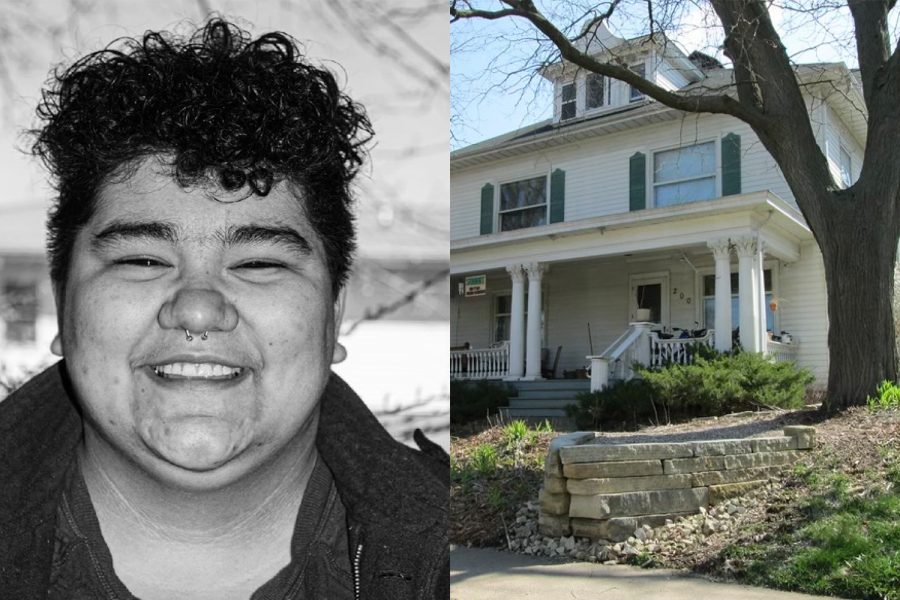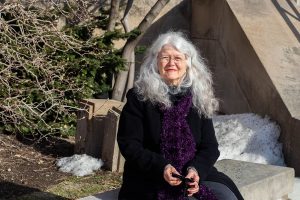Local collective housing lifestyle ‘drastically’ changes during pandemic
The River City Housing Collective established house rules after the pandemic began almost a year ago. The collective has had four positive COVID-19 pandemic cases since March 2020.
Photo of President of River City Housing Collective Al Christopher (left) and one of the organization’s houses (right). Contributed.
March 8, 2021
The River City Housing Collective has provided community-centered living in the heart of Iowa City since 1977. The pandemic has presented the housing collective with new safety concerns, however, forcing resident gatherings onto Zoom and disrupting their normal way of life.
President of the River City Housing Collective Al Christopher said life in the collective community has drastically changed since the pandemic began. For example, the collective adjusted to the pandemic and instituted rules for virus mitigation, he said.
“We stopped all in-person meetings, so everything is done over Zoom,” Christopher said. “People still cook, but we all usually eat in our rooms. Masks are also required and in common spaces.”
The collective was founded in the 1970s by the University of Iowa Student Senate to respond to limited options of affordable housing in Iowa City, Christopher said. Three of Iowa City’s historic homes make up the housing collective.
Christopher said, in a collective, tenants act as their own landlords, have their own rooms, and share kitchen and communal spaces.
The River City Housing Collective is not currently affiliated with the UI, Christopher said, but often houses students.
For COVID-19 mitigation, he said the collective also social distances and sanitizes everything in the houses twice a day.
In an email to The Daily Iowan, Johnson County Community Health Manager Sam Jarvis wrote that being in a “bubble” with families or friend groups is a way to make a commitment to be safer and keep social interactions within the group.
“If folks are in a coop living situation, roommates, or however, and someone gets ill, our staff cover much of those concerns during the investigation and contact tracing,” Jarvis wrote.
“Whether it’s community resources or strategies to stay safer, we do our best to cover those issues and concerns during our case investigations.”
Iowa City Cohousing, another collective in the area, declined to comment on the changes brought about by COVID-19.
RELATED: Life at Iowa: When roommates don’t work out
The Centers for Disease Control and Prevention recommends social distancing and wearing a mask in communal areas when living in a shared housing setting during the pandemic.
Christopher said there has been a total of four COVID-19 cases within the collective. He said there are individuals who are considered high risk at each house.
“We do our best to accommodate whoever is living here,” he said.
When someone contracts COVID-19 in one of the houses, Christopher said the housemates work together to provide food, water, and other necessities while the individual quarantines in their bedroom.
“We ask them for their emergency contacts, so we can keep them updated,” Christopher said.
“We set them up with a mini fridge and microwave outside their room, so they can easily access that without the kitchen and then we coordinate with someone to make sure they have water.”
UI senior Alec Nelson said he had to devise a COVID-19 mitigation plan over text when one of his two roommates tested positive for COVID-19 in the fall semester.
“It was a frantic group chat. As soon as I heard about the positive case, I just cleared my place,” Nelson said. “I just had to get out of there.”
Nelson said he tried to take all necessary precautions to not be exposed to the virus because his mother is considered at an increased risk for COVID-19. Nelson said he has visited his home in Valparaiso, Indiana, for academic breaks since the pandemic began.
He said having fewer roommates might have saved him from a lot of stressful COVID-19-based situations.
“I don’t know if I would change my living situation though,” he said. “Humans are social creatures.”
Christopher said numbers of tenants have been down operating at less than half capacity since the pandemic began. He said there has been an uptick of applicants for the fall.
“When things first got around, it wasn’t like smooth sailing for us,” he said. “It was a lot of trial and error — figuring out what the community was comfortable with and finding a happy medium.”





